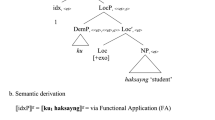Abstract
This paper argues that the most recent analyses of guo as proposed in Pan and Lee [(2004). The role of pragmatics in interpreting the Chinese perfective markers -Guo and -Le. Journal of Pragmatics, 36, 441–446] and Lin [(2006). Time in a language without tense: The case of Chinese. Journal of Semantics, 23, 1–53] still fail to explain the predicate restriction and the discontinuity property of guo in a satisfying manner. An alternative analysis, which is a more fine-grained version of Lin’s (2006) proposal, is suggested. It is proposed that a sentence with the form guo(P) is true in a world w if and only if the run time of the internal stage of an event described by P is wholly before the speech time, and if the event e has a target state, then there is an inertia world w inr stretching from w such that another event é described also by P but distinct from e true in it at an interval containing the speech time.
Similar content being viewed by others
References
Chen G.-T. (1979). The aspect markers LE, GUO, and ZHE in Mandarin Chinese. Journal of the Chinese Language Teachers Association, 14(2): 27–46
Cheng, L., Giannakidou, A. (to appear). The non-uniformity of wh-indeterminates with free choice in Chinese. In G. Tsoulas & K.-H. Gil (Eds.), Strategies of quantification: Selected papers from the workshop on quantification and crosslinguistic variation. Oxford: Oxford University Press.
Dai Y. (1997). Xiandai hanyu shiti xitong yanjiu [A study of Aspect in Modern Chinese]. Hangzou, Zhejiang Educational Press
Dowty D. (1977). Word meaning and montague grammar. Dordrecht, Kluwer Academic Publishers
de Swart, H. (1991). Adverbs of quantification: A generalized quantifier approach. PhD dissertation, Rijksuniversiteit Groningen.
Huang M.-J. L., Davis P.W. (1989). An aspectual system in Mandarin Chinese. Journal of Chinese Linguistics, 17(1): 128–166
Iljic R. (1990). The verbal suffix -guo in Mandarin Chinese and the notion of recurrence. Lingua, 81: 301–326
Kamp H., Reyle U. (1993). From discourse to logic: An introduction to model theoretic semantics, formal logic and discourse representation theory, Part 2. Dordrecht, Kluwer Academic Publishers
Kratzer A. (1994). The event argument and the semantics of voice, ms. Amherst, University of Massachusetts
Li C.N., Thompson S.A. (1981). Mandarin Chinese. Berkeley and Los Angeles, University of California Press
Liao X.Z. (2003). The study of result states and the aspectual-temporal meaning of GUO in Mandarin Chinese. MA thesis, National Chiao Tung University, Hsinchu Taiwan
Lin J.-W. (2007). Event decomposition and the syntax and semantics of Chinese durative phrases. In: Dölling J., Heyde-Zybatow T. (eds) Event structures in linguistic form and interpretation series: language, context and cognition (in press). Berlin, New York, Mouton de Gruyter
Lin J.-W. (2006). Time in a language without tense: The case of Chinese. Journal of Semantics, 23: 1–53
Pan H., Lee P. (2004). The role of pragmatics in interpreting the Chinese perfective markers -Guo and -Le. Journal of Pragmatics, 36: 441–466
Parsons T. (1990). Events in the semantics of English: A study in subatomic semantics. Cambridge Massachusetts, MIT Press
Smith C. (1997). The parameter of aspect (2nd ed). Dordrecht, Kluwer Academic Publishers
Tiee H. (1986). A reference grammar of Chinese sentences. Tucson, The University of Arizona Press
Wu, J.-S. (2005). Discontinuity and the semantics of experiential guo in Mandarin. Paper presented at the 3rd workshop on formal syntax and semantics, April, 2005, National Tsinghua University, Hsinchu, Taiwan.
Xiao R., McEnery T. (2004). Aspect in Mandarin Chinese: A corpus-based study. Amsterdam/ Philadelphia, John Benjamins Publishing Company
Yeh M. (1996). An analysis of the experiential Guo in Mandarin: A temporal quantifier. Journal of East Asian Linguistics, 5(1): 51–82
Zhang L. (1995). A constrastive study of aspectuality in German, English and Chinese. Berkeley Insights in Linguistics and Semiotics 19. New York, Peter Lang
Author information
Authors and Affiliations
Corresponding author
Additional information
An earlier version of this paper was presented at the joint conference of IACL14 & IsCLL10 held on May 25–28 at Academia Sinica in Taipei. I want to thank the audience there for their questions and comments. I am indebted to Paul Portner and an anonymous reviewer for valuable comments which lead to the final form of this paper. Finally, the research for this paper would not have been possible without the support of the government of Taiwan through the MOE ATU Program and a NSC Grant /#95–2411-H-009-009.
Rights and permissions
About this article
Cite this article
Lin, JW. Predicate restriction, discontinuity property and the meaning of the perfective marker Guo in Mandarin Chinese. J East Asian Linguist 16, 237–257 (2007). https://doi.org/10.1007/s10831-007-9013-5
Received:
Accepted:
Published:
Issue Date:
DOI: https://doi.org/10.1007/s10831-007-9013-5



